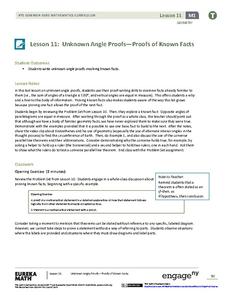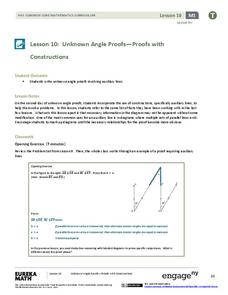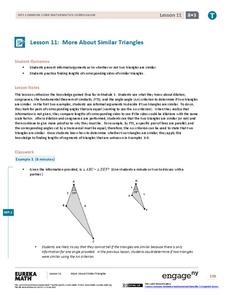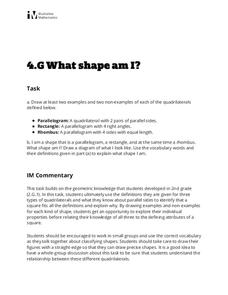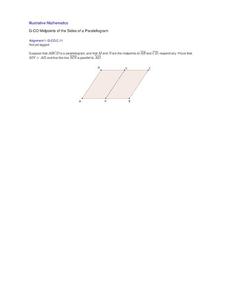Radford University
Parallel Lines Cut By a Transversal
Perhaps planning a city isn't so difficult after all. Scholars first perform geometric constructions and investigate how parallel lines are useful in real-world situations. They then work on a city design project, drawing street maps,...
EngageNY
Unknown Angle Proofs—Proofs of Known Facts
Lead the class in a Greek history lesson with a geometric twist. Pupils relate a short video about geometric properties to modern-day methods of solving for unknown angles. They discuss parallel line theorems and complete...
Curated OER
Transformations in the Coordinate Plane
Your learners connect the new concepts of transformations in the coordinate plane to their previous knowledge using the solid vocabulary development in this unit. Like a foreign language, mathematics has its own set of vocabulary terms...
EngageNY
Unknown Angle Proofs—Proofs with Constructions
Provide your emerging mathematicians with the tools to learn as they incorporate auxiliary lines to solve unknown angle proofs in this continuing segment. They decipher information from a diagram to uncover the missing pieces and...
Illustrative Mathematics
Lines of Symmetry for Quadrilaterals
Explore how lines of symmetry help define different categories of quadrilaterals. Looking at a square, rectangle, trapezoid, and parallelogram, young mathematicians discover that each shape has its own, unique symmetry. Encourage your...
EngageNY
Construct a Perpendicular Bisector
How hard can it be to split something in half? Learners investigate how previously learned concepts from angle bisectors can be used to develop ways to construct perpendicular bisectors. The resource also covers constructing a...
Mathematics Vision Project
Module 4: Similarity and Right Triangle Trigonometry
Right you are to use a great resource. Starting with a lesson on dilations, scholars learn about similarity transformations and similar triangles. They use the knowledge to develop an understanding of right triangle trigonometry in later...
Curated OER
Ruler and Compass Constructions
Fourth and fifth graders examine how to construct perpendicular lines and to bisect angles using rulers and compasses in this unit of lessons. They design a number of polygons using these methods.
National Gallery of Canada
Mastering One-Point Perspective
Cover one-point perspective through observation and practice. Class members examine several works of art that use one-point perspective, look at magazine images to find the vanishing points and horizon lines, and draw their own city...
Mathematics Vision Project
Module 3: Geometric Figures
It's just not enough to know that something is true. Part of a MVP Geometry unit teaches young mathematicians how to write flow proofs and two-column proofs for conjectures involving lines, angles, and triangles.
EngageNY
Fundamental Theorem of Similarity (FTS)
How do dilated line segments relate? Lead the class in an activity to determine the relationship between line segments and their dilated images. In the fourth section in a unit of 16, pupils discover the dilated line...
EngageNY
Informal Proofs of Properties of Dilations
Challenge the class to prove that the dilation properties always hold. The lesson develops an informal proof of the properties of dilations through a discussion. Two of the proofs are verified with each class member performing the...
EngageNY
More About Similar Triangles
Determine whether two triangles are similar. The lesson presents opportunities for pupils to find the criterion needed to show that two triangles are similar. Scholars use the definition of similarity to find any missing side...
EngageNY
Informal Proof of AA Criterion for Similarity
What does it take to show two triangles are similar? The 11th segment in a series of 16 introduces the AA Criterion for Similarity. A discussion provides an informal proof of the theorem. Exercises and problems require scholars to apply...
EngageNY
Complex Numbers and Transformations
Your learners combine their knowledge of real and imaginary numbers and matrices in an activity containing thirty lessons, two assessments (mid-module and end module), and their corresponding rubrics. Centered on complex numbers and...
Illustrative Mathematics
What Shape Am I?
Sharpen your pencil and grab a ruler, it's time to draw some quadrilaterals! Given the definition of a parallelogram, rectangle, and rhombus, learners draw examples and nonexamples of each figure. The three definitions are...
Illustrative Mathematics
Midpoints of the Sides of a Paralellogram
This task asks learners to prove that the segment joining the midpoints of two sides of a parallelogram is both congruent and parallel to an adjacent side of the parallelogram. The activity would be good to use in a discussion about how...
Illustrative Mathematics
Is This a Parallelogram?
If both pairs of opposite sides of a quadrilateral are congruent, is the quadrilateral a parallelogram? This task asks learners to determine the answer and to support their answer with a proof. The resource includes a commentary for...
Curated OER
Archery
Students are shown proper stance, nocking, targeting, and release techniques of archery. They follow basic safety procedures involved in handling and using archery equipment. Students practice shooting aluminum or fiberglass shaft arrows.
Curated OER
Reflections
Fifth graders create a reflection of a poygon using a Mira. They discover that a line connecting a vertiex of a polygon and the corresponding vertex of its reflection is perpendicular to the line of reflection. Students create a glide...
Education Development Center
Proof with Parallelogram Vertices
Geometric figures are perfect to use for proofs. Scholars prove conjectures about whether given points lie on a triangle and about midpoints. They use a provided dialogue among fictional students to frame their responses.
Virginia Department of Education
Properties of Quadrilaterals
What type of quadrilateral is that? Discover the difference between the types of quadrilaterals. Small groups investigate types of quadrilaterals using geometry software to find their properties. To keep track of the different...

